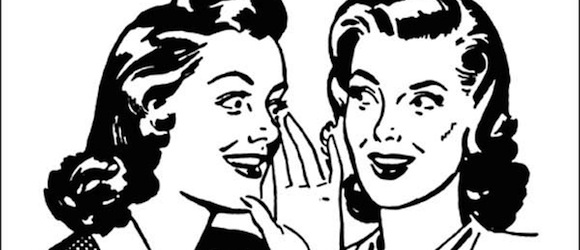Start Your Vocal Chords, Ladies: Young Women Are the Biggest Linguistic Trendsetters
Girls Just Wanna Have Fun

We all know that language changes pretty fast. Dictionaries, while useful reference materials, aren’t what language is derived from, but merely a blurry snapshot of an ever changing lexicographical landscape. Who pushes most of that change? Who appears to be on the cutting edge of significant, lasting, and eventually socially widespread changes in inflection and diction?
Young women, according to a lot of linguists.
Most of the vocal trends we associate with young women, like uptalk (ending declarative sentences as if they were questions), using “like” as a pause word rather than as a verb or preposition, or the infamous vocal fry (ending a sentence with a deep dip in tone) are associated with “immaturity or even stupidity,” as the New York Times puts it. But linguists know: the living evolution of communication doesn’t make a lot of stupid choices. Says Nassima Abdelli-Beruh, author of the internet-infamous vocal fry study: “They use this as a tool to convey something. You quickly realize that for them, it is as a cue.”
It should come as no surprise to anyone that if linguists observe trends in language change, they’re going to find the youth of the culture at the forefront of it. But linguists have also found the women tend to be “half a generation ahead of males on average,” according to Dr. Mark Liberman of the University of Pennsylvania, and that doesn’t mean that the change stays there.
Even an American president has been known to uptalk. “George W. Bush used to do it from time to time,” said Dr. Liberman, “and nobody ever said, ‘Oh, that G.W.B. is so insecure, just like a young girl.’ ”
The same can be said for the word “like,” when used in a grammatically superfluous way or to add cadence to a sentence. (Because, like, people tend to talk this way when impersonating, like, teenage girls?) But in 2011, Dr. Liberman conducted an analysis of nearly 12,000 phone conversations recorded in 2003, and found that while young people tended to use “like” more often than older people, men used it more frequently than women.
In fact, like’s use as a pause word has made its way into Websters, and even uptalk has been observed to convey many different tones in a person’s speech, much broader than simply attempting to appear immature. In 1991 another UPenn linguist, Cynthia McLemore, found that “senior members of a Texas sorority used uptalk to make junior members feel obligated to carry out new tasks.”
Dr. [Penny] Eckert of Stanford recalled a study by one of her students, a woman who worked at a Jamba Juice and tracked instances of uptalking customers. She found that by far the most common uptalkers were fathers of young women. For them, it was “a way of showing themselves to be friendly and not asserting power in the situation,” she said.
As to why young women are on the bleeding edge of language change, no one is really sure why. Some of the linguist hypotheses listed by the New York Times seem rooted in some less than scientifically supported claims about the nature of women’s general personalities: that we are more sensitive to social interactions, for example. Other ideas include that we are still compensating for decades of cultural expectation that we be “sedate and decorous,” by being very language savvy or that we are given more leeway in society to speak “flamboyantly.” Which are all interesting theories, but I’m not sure how one would put them through the scientific process in a rigorous way.
In either case, relax about using like, uptalk, and vocal fry. Language changes. And you might just be an early adopter.
(Read the whole article at the New York Times.)
Have a tip we should know? [email protected]